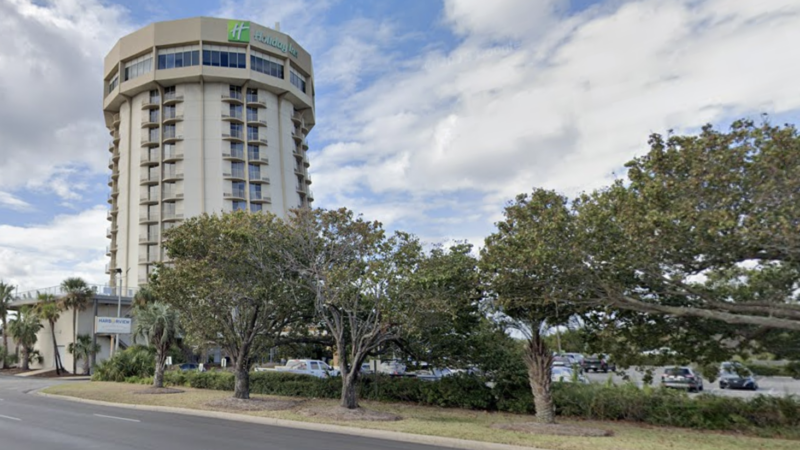Whistleblower John Barnett’s family files wrongful death suit against Boeing
The family of John Barnett, the Boeing whistleblower who died a year ago as he pursued a lawsuit against his former employer, is suing the airplane maker, saying that Barnett’s “PTSD, depression, anxiety, and panic attacks, all caused by Boeing’s wrongful conduct, caused him to take his own life.”
The wrongful death civil suit was filed in federal court in Charleston, S.C., where Barnett once worked as a quality control manager for Boeing — and where his body was discovered in a Holiday Inn parking lot in 2024.
In response to the new lawsuit, Boeing said in a brief statement sent to NPR, “We are saddened by John Barnett’s death and extend our condolences to his family.”
The company has not yet filed a response to the lawsuit.
High-profile safety issues with Boeing’s planes triggered a congressional hearing last June, where then-Boeing CEO Dave Calhoun acknowledged that Boeing employees have been fired for retaliating against whistleblowers.
Barnett’s death on March 9, 2024, at age 62 was ruled a suicide by the Charleston County Coroner. Police said he was found in his locked vehicle, a bright orange Dodge Ram pickup truck, with the key fob in his pocket and what appeared to be a self-inflicted gunshot wound. Days earlier, he had driven from his home in Louisiana so he could give deposition testimony in a whistleblower retaliation case against Boeing, his attorneys, Robert Turkewitz and Brian Knowles, told NPR at the time.
In court filings, the family’s attorneys included an image of notebook pages that police found in Barnett’s truck. The handwritten messages sent love to his family and friends; they also discussed Barnett’s ongoing problems with his former employer.
One portion reads: “I pray the mother******s that destroyed my life pay!!! I pray Boeing Pays!!! Bury me face down so Boeing and their lying a** leaders can kiss my a**.”
The lawsuit seeks a jury trial to recover financial losses and impose punitive damages on Boeing, accusing the company of contributing to Barnett’s “ongoing mental distress and unavoidable death.”
During his more than 30-year career at Boeing, Barnett worked at its plants in Everett, Wash., and in South Carolina, according to congressional and court records. He repeatedly alleged that Boeing’s manufacturing practices had declined — and that rather than improve them, managers had pressured workers not to document potential defects and problems.
The lawsuit accuses Boeing of repeatedly retaliating against Barnett for actions such as objecting to allowing mechanics to self-inspect and approve their own work and insisting on documenting defects and other problems, according to the filing. It alleges that Barnett was harassed and blacklisted — blocked from transferring to jobs he wanted.
Barnett then became a whistleblower, going public with his concerns about serious safety issues in Boeing’s planes.
The wrongful death lawsuit quotes from an email Barnett sent three years before his death, in which he said he had once been a happy guy who loved his work — but, he wrote, “Boeing has absolutely destroyed my outlook on life.”
Two months after his death, another Boeing whistleblower, Joshua Dean, a former quality auditor at a key Boeing supplier, died at 45 after being diagnosed with a MRSA bacterial infection.
When he died, Barnett was near the end of several days of depositions in his whistleblower retaliation case against Boeing.
His lawyers in that case, Turkewitz and Knowles, are now representing the family along with noted attorneys David Boies and Sigrid McCawley, whose previous work includes representing victims of disgraced financier Jeffrey Epstein.
Boeing’s troubles continued for much of 2024, as its Starliner spacecraft was deemed too risky to carry astronauts home from the International Space Station. The company received good news on Friday, as the Trump administration announced that it selected Boeing to build a next-generation fighter jet, the F-47.
If you or someone you know may be considering suicide or be in crisis, call or text 988 to reach the Suicide & Crisis Lifeline.
Congress failed to extend Obamacare subsidies. This Democrat says Trump can save them
Sen. Peter Welch, D-Vt., says he thinks the Senate can pass a "retroactive" Affordable Care Act subsidy extension, but "we need President Trump."
Rideshare union rights, social media limits and other state laws taking effect Jan. 1
Every new year, public media reporters across the country bring us some of the new state laws taking effect where they are. Here are six in 2026.
Guides to help you tackle your New Year’s resolutions
From building your strength to tackling credit card debt, NPR's Life Kit has a newsletter journey to help you tackle your New Year's resolution.
Guides to help you tackle your New Year’s resolutions
From building your strength to tackling credit card debt, NPR's Life Kit has a newsletter journey to help you tackle your New Year's resolution.
Dozens presumed dead in fire at Swiss Alps bar during New Year’s celebration
Dozens of people are presumed dead and about 100 injured, most of them seriously, following a fire at a Swiss Alps bar during a New Year's celebration, police said Thursday.
Crypto soared in 2025 — and then crashed. Now what?
For most of 2025, cryptocurrencies such as bitcoin surged as President Trump vowed to make the U.S. a crypto leader. But now, a severe sell-off has shaken the sector.






